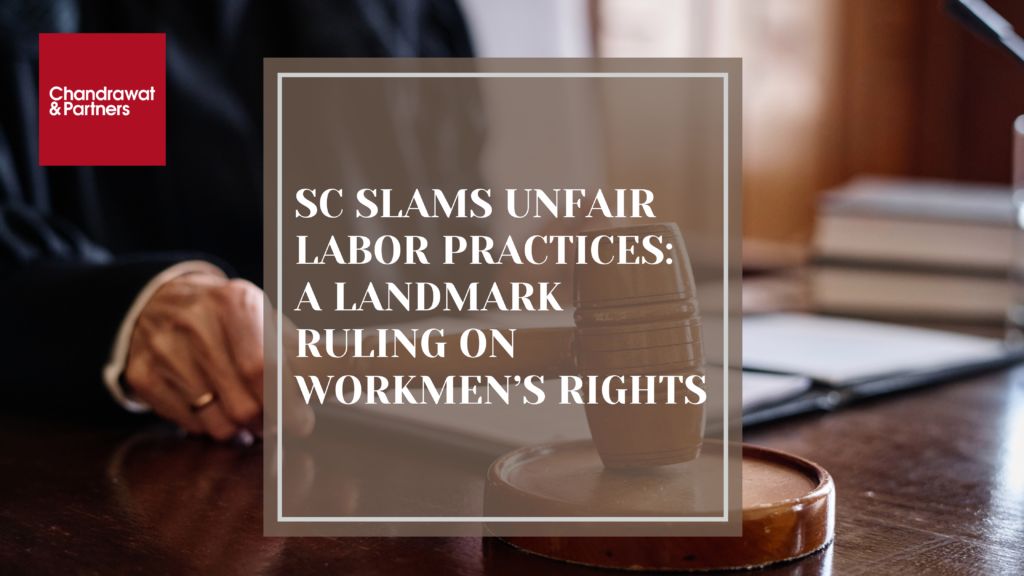Home > Recent Judgements > SC Slams Unfair Labor Practices: A Landmark Ruling on Workmen’s Rights
Feb 06, 2025
SC Slams Unfair Labor Practices: A Landmark Ruling on Workmen’s Rights
BACKGROUND
In the case of Shripal and Anr Vs Nagar Nigam Ghaziabad (2025), Shripal and other workmen were engaged as gardeners by Ghaziabad Nagar Nigam since 1998-1999, performing horticultural duties without formal appointment letters. They claimed denial of minimum wages and other statutory benefits. In 2004, they raised an industrial dispute seeking regularization of their services. However, during conciliation, they were orally terminated in 2005 without notice or compensation, violating Section 6E of the U.P. Industrial Disputes Act, 1947. The Labour Court passed conflicting decisions reinstating some with back wages while denying relief to others, citing contractor engagement. Both parties challenged this in the Allahabad High Court, which ordered re-engagement on daily wages but not full reinstatement. Dissatisfied, both parties approached the Supreme Court.
ISSUES OF THE CASE
- Whether the termination of the workmen during the pendency of conciliation proceedings, without notice or retrenchment compensation, was legal under Sections 6E and 6N of the U.P. Industrial Disputes Act, 1947?
- Whether there existed a direct employer-employee relationship between the workmen and Ghaziabad Nagar Nigam, or were the workmen engaged through contractors, affecting their right to reinstatement and regularization?
- Whether the workmen are entitled to regularization of their services and reinstatement with back wages, considering their long-term engagement in perennial roles and the State’s ban on fresh municipal recruitments?
- Whether the principle of “equal pay for equal work” applies to the workmen, entitling them to wages and benefits equivalent to those of regular employees performing similar duties?
JUDGEMENT OF THE COURT
The Supreme Court held that the termination of the workmen was illegal as it violated Section 6E and section 6N of the U.P. Industrial Disputes Act, 1947, which prohibit termination during conciliation proceedings without proper notice and retrenchment compensation. The Court found that the workmen were directly employed by Ghaziabad Nagar Nigam, not through contractors, as there was no evidence of any contractual arrangement. The Court ruled that the workmen were entitled to reinstatement with continuity of service and directed the Nagar Nigam to reinstate them within four weeks. It also ordered that the workmen be given 50% of back wages from the date of their termination until reinstatement, considering their long years of service.
Furthermore, the Court directed the Nagar Nigam to initiate a regularization process within six months of reinstatement, recognizing that the work performed by the workmen was perennial in nature. The Court rejected the Nagar Nigam’s argument that the ban on new municipal recruitments could be used to deny regularization, stating that such bans cannot override the legitimate rights of long-serving employees. Lastly, the Court emphasized the principle of “equal pay for equal work,” holding that the workmen should not be paid less than regular employees performing similar duties. As a result, the appeals filed by the workmen were allowed, and those by the Nagar Nigam were dismissed.
SUPREME COURT OBSERVATION
The Supreme Court declared the termination of workmen by Ghaziabad Nagar Nigam illegal for violating Sections 6E and 6N of the U.P. Industrial Disputes Act, 1947. Since the termination occurred during conciliation proceedings, the employer failed to obtain prior approval, and the workmen were dismissed orally without notice, retrenchment compensation, or due process. The Court rejected the Nagar Nigam’s claim that the workmen were hired through a contractor, finding that they were directly employed and supervised by the Horticulture Department. The lack of contractor agreements, payment records, or tender documents further weakened the employer’s defense.
Recognizing procedural and substantive flaws in the termination, the Court ordered reinstatement with continuity of service, directing Nagar Nigam to reinstate the workmen within four weeks and pay 50% back wages. On regularization, the Court ruled that the workmen should be considered for permanent employment within six months, rejecting the employer’s argument that a recruitment ban prevented regularization. It held that essential and long-term work, not administrative bans, should determine employment status.
Applying the “equal pay for equal work” principle, the Court directed that the workmen receive wages and benefits on par with regular gardeners. It criticized Nagar Nigam for unfair labor practices, exploiting workers as daily wagers despite their essential roles. The Supreme Court allowed the workmen’s appeals, dismissed Nagar Nigam’s appeals, and reaffirmed the workmen’s rights to job security, fair wages, and protection against arbitrary termination.
For more information or queries, please email us at
enquiries@chandrawatpartners.com





